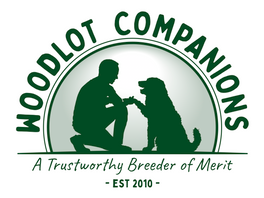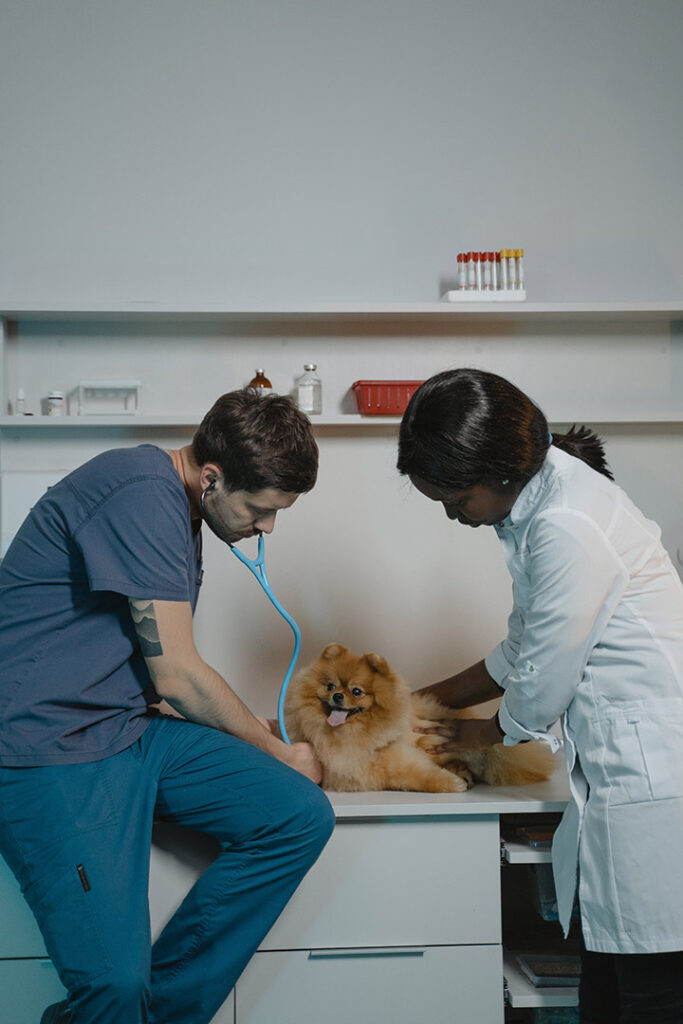Having a puppy can cause a lot of warm fuzzies with all of their snuggles, but can cause just as much stress when we aren’t sure how to keep them healthy and safe! There are several approaches to the basics of optimal puppy health- in this blog we will review some of the most common. Of course, all health concerns should be discussed with your veterinarian- but we are always happy to share the knowledge we’ve gained over the last 15 years if non-emergency questions arise from any of our Woodlot families!
Vaccine and Disease Prevention in Puppies
All of our puppies here at Woodlot have been through their first set of vaccinations within the first 6-8 weeks, are enrolled in a worming program, and have had a full exam with our veterinarian. However, many of the vaccinations that are started while they are in our care are just the first round in a set of three. Finding a good vet in your area and making the appointments necessary allow you to go exploring the world together with more peace of mind. Additionally, your vet will know which shots are needed for your region.
What is Parvo?
A vaccine you want to make sure you keep up to date on is parvo. A disease with deadly consequences that is unfortunately common in puppies and highly contagious and is most prevalent in puppies who have unvaccinated mothers. Puppies from ages six weeks to six months are the most susceptible. This is one of the immunizations that is administered in a set of three shots – making it important to only socialize with grown vaccinated dogs until completed. A puppy with parvo will have symptoms such as bloody diarrhea, vomiting, and loss of appetite. The sooner you catch the early signs of this virus in your furry friend and get them to the vet, the better chance they have of survival. For more information on parvo check out this article from the AKC.
Once you establish a good relationship with your local vets office many will send reminders for vaccinations as they are needed. If they don’t, or you would like information on what treatments your pup is receiving you can familiarize yourself with the standard set of vaccinations and boosters your dog will need as they grow by downloading a vaccination schedule here.
What is Giardia?
You may have heard to avoid drinking water from lakes or streams to prevent getting this stomach bug that causes diarrhea, nausea, and dehydration when infected. However, you may not have realized that this same infection affects more than 50% of puppies and 1 in 10 adult dogs. Most healthy adult dogs will fight off this infection naturally, rarely even showing signs that they have it. For young puppies and elderly dogs, this bacteria can prove fatal, but because death is extremely rare it’s not a vaccine that is considered to be a core necessity. We believe it may be one you want to consider though because once this parasite is contracted it’s messy to deal with, spreads rampantly among your pets, and needs medication that can only be prescribed by a veterinarian. Even though this parasite can infect both animals and humans the probability is low that your pup would pass this along to you. The most important part of preventing and managing the infection is of course keeping everything clean.
Because this parasite is spread through contaminated food, water, and fecal matter it is best to provide your pet with access to clean water and remove poop regularly if not immediately when you know your puppy is infected. Clean and disinfect potentially contaminated items as well as floors regularly while symptoms are active and bathe your dog to ensure no poop is in their coat. Anytime diarrhea is present and does not go away we highly recommend seeking out vetrinary care as it can be a sign of other more serious problems and if you decide to vaccinate for Giardia while your pup is young it is one possibility you don’t have to worry about.
Does my puppy need flea and tick prevention?
If your canine companion is joining your family during the start of these colder months it may not have crossed your mind to start any flea or tick prevention. However, it is recommended that prevention start and continue all year round! Fleas and ticks are both troublesome pests that can be a nightmare to get rid of and can carry diseases that could prove fatal to your pup. Only 1 in 100 fleas can actually be seen and those that you can see are adults, which make up only 5% of any flea population. Ticks on the other hand are not as plentiful but are tough to spot underneath your pet’s coat. Both of these parasites enjoy gorging themselves on blood, which makes them potentially lethal. So, before spending too much time out in that warm inviting sunshine now is the time to look into the many over-the-counter prevention medications available.
Once you successfully begin prevention, it is still wise to keep an eye out for any excessive itching and making a habit to check all family members for ticks after any extended time out in nature. If a tick is found, proper removal is done with tweezers placed at the base of the tick’s body closest to the skin and pulling straight back. Once removed, apply antiseptic and keep the tick in a container. Store the trapped tick in the freezer in case any symptoms arise. Keep an eye out for head shaking/shivering, irritated skin, loss of appetite, and fatigue – these are a few of the signs that your dog may need a trip to the veterinarian for further treatment.
When should I start heartworm treatment for my puppy?
Another preventative treatment that is often thought as seasonal is for fending off Heartworm. However, the American Heartworm Society recommends that puppies start a heartworm preventive as early as the product label allows, and no later than 8 weeks of age. Heartworm is a parasitic worm that spreads through infected mosquitos that enter your pets body through their bite, moving into the bloodstream, eventually infecting your puppy’s heart and lungs. They have been known to grow up to 12 inches long and if left untreated will damage the animals heart, lungs, liver and kidneys. Despite there being fewer mosquito populations in the colder months veterinarians still recommend keeping up on prevention year round since the medications only target Heartworm larvae, not the adults. Once a dog has adult heartworms, the worms have to be killed using a potentially dangerous arsenic-containing drug. The early signs are subtle and can often be missed. Look out for a persistent cough, trouble breathing, tiredness after mild activity and a decreased appetite. Because the medication only targets the larvae it is recommended to have your pup tested for Heartworm before starting or resuming prevention after a break.
Don’t let all these preventions, shots and vaccines intimidate you from enjoying all this beautiful autumn weather though! Even if you haven’t completed all the rounds of shots you can still enjoy taking a drive, setting up a play date with an older dog, or breaking in a new toy in the backyard.



